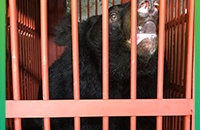Animals Asia welcomes China change to testing on animals law
13 November 2013
Animals Asia has welcomed news that China intends to end laws requiring cosmetics to be tested on animals.
Guidelines from the China Food and Drug Administration suggest animals testing will no longer be mandatory from June 2014. This will initially be applied to China-made products and eventually, it is anticipated, to imports.
Animals Asia Animal Welfare Director Dave Neale said:
“This is not the first time in recent weeks that we have talked of significant breakthroughs in terms of animal welfare in China. Young people are turning in greater numbers to animal welfare activism and they are being heard.
“This change has been long hoped for but few anticipated it happening quite so soon. In many ways this is a victory for all anti-testing campaigners. The people who persuaded Western governments to ban animal testing have caused a domino effect that has resonated with both the authorities and people of China resulting in this ground-breaking progress.
“The world has long talked of China being open for business - well now it’s open to discussion too. China is listening and it’s taking action.
Past regulations meant that if international cosmetics companies wanted to market ranges in China they were forced to test on animals - a fact unlikely to go down well with customers elsewhere.
It’s hoped that while testing on animals has not been outlawed, the option now to create “cruelty free” brands will see increasingly aware consumers lured away from brands associated with animal testing.
Animals Asia founder Jill Robinson added:
“A changing China is the biggest story in international animal welfare activism today. Just as regulations for testing cosmetics can become internationally standardised - so can concepts of animal welfare and conservation.
“Environmentally speaking China is more self-aware than it has ever been. Young people, journalists, politicians, businessmen, China’s citizens - they are all pushing hard for change and there is much evidence to suggest they’re making headway.”
BACK




 Freedom after two decades: Moon bears Nang and Mua rescued
Freedom after two decades: Moon bears Nang and Mua rescued
 With heavy hearts we say goodbye to our beloved Tulip
With heavy hearts we say goodbye to our beloved Tulip
 Three moon bears rescued from notorious bear bile farming hotspots in Vietnam
Three moon bears rescued from notorious bear bile farming hotspots in Vietnam
